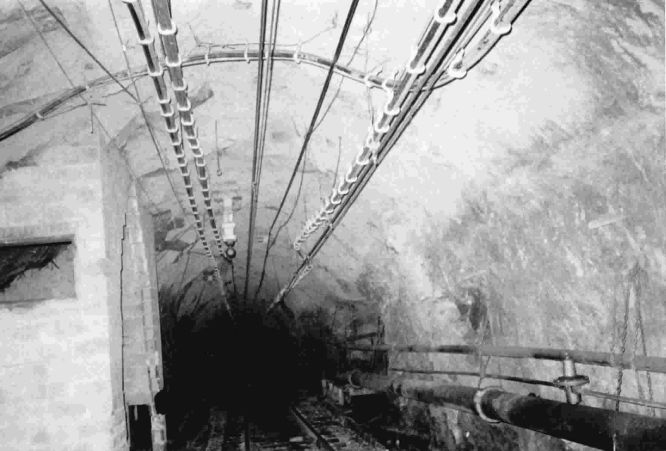Granduc Mine

The Tunnel
Photo -THE TUNNEL-PHASE 2
Phase II
A solution to these problems was worked out in late 1965, when Granduc Mines Limited leased its properties to a new wholly-owned Newmont subsidiary, Granduc Operating Company, and to American Smelting and Refining Company, who shared the lease equally and were to provide all of the necessary funds to complete the project. As part of the reorganization, Newmont surrendered its interest in Granduc Mines Limited, which was to receive a royalty on the net income from Granduc's production. The $30 million unspent bank loan was also cancelled. It was then agreed that Granduc Operating Company would be the managing partner of the new venture. Thus the combination of resources in finance and technical skills of two of the world's great mining organizations was made available.
Work resumed on the tunnel not long after the avalanche, this time all of it done from Tide Lake. Using a sliding work floor at the tunnel face-essentially a movable rail switching yard-the tunnel crews set these world records for driving a tunnel this size in the 54-month rush to complete it.
Best single day advance 115 feet
Best six consecutive day advance 601 feet
Best one-mile advance 73 work days
Best month's advance 2,320 feet.
These records were set in spite of problems of encountering areas of weak rock that required extensive support and, at one point, heavy flows of water under high pressure that had to be sealed off by grouting. In December, 1968, the tunnel crews broke into the mine area, and the job was done.
Mixed with water and suitable chemicals, the Granduc ore goes through these floatation machines. Meanwhile, engineering proceeded on the concentrator and other surface facilities to be located at Tide Lake. Initial site work started in the fall of 1966. Construction went swiftly during the short summers of 1967 and 1968. By fall all surface facilities were covered and construction did not stop until completion in November, 1970.
The remote location, the type of terrain and the bad weather, made supply of equipment and construction materials difficult. Handling was minimized by loading trailers in Vancouver, barging them to Stewart, then hauling them to Tide Lake over a 32-mile road, all of which was improved or built by the company at a cost of $10 million.
In the course of construction, a fully-equipped marine terminal for bringing in supplies and shipping out concentrates was also built at Stewart. Development of the mine began after the tunnel was completed and went on until the mill was ready to operate.
NEXT MILLING